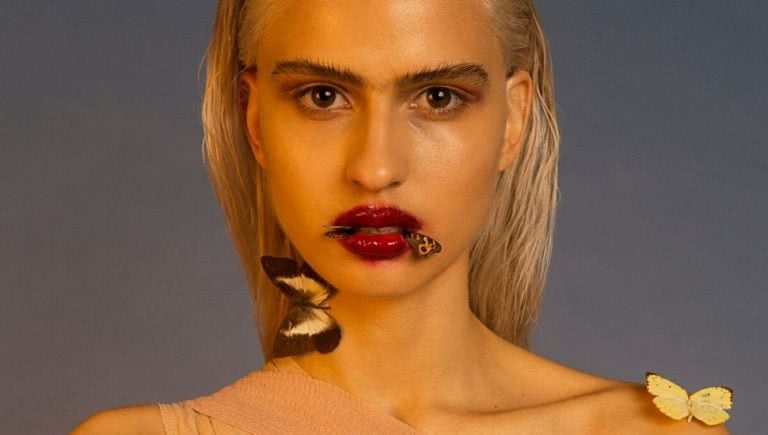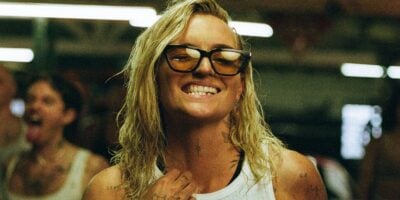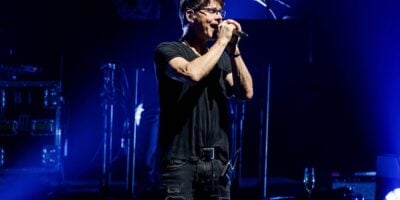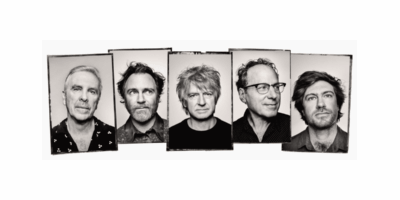We sit down with Banoffee ahead of the February 21 release of her brand new album Look At Us Now Dad, a glimmering and glorious pop project from Australia’s very own tour de force of the genre.
According to the always factual Wikipedia, Banoffee pie is an English dessert pie made from bananas, cream and toffee, combined either on a buttery biscuit base or made from crumbled biscuits and butter. Some versions of the recipe also include chocolate, coffee or both. Softness and sweetness on a tough base. Somewhere in here is a metaphor about the juxtaposition of sugary and savoury, and how it relates to Pop music, but such simple wordplays wouldn’t be fair to apply to the chameleonic talents of Martha Brown, who shares a name with the popular dessert.
Banoffee, who hails from Melbourne, is sonically lavish, lyrically vulnerable at all times, and carries about her a prowess that has been sorely lacking in the world of pop and pop-adjacent endeavours for quite some time now, especially Downunder. While songs flirt with subtle gestures of melancholy on her brand new project, everything is solidly transfixed on the power of the self.
Brown has never been as sure of her sound and energy as she is here on her first full-length album. Lovelorn and driven by the pleasurable trappings of lust, the album always stands its ground in the face of the fall. Falling in love, falling out of love, falling for the wrong person, falling into the darkest pits of the self. Look At Us Now Dad is reliance put to music. Every moment of weakness is backed by powerful resolve, every shine of sadness is but a look into what has been overcome.
Songs like ‘Chevron’ and ‘Permission’ act as windows into the soul of Banoffee. Who she is as a woman and a pop-music genius are all on the table with this debut project, and the final result is something to be endlessly proud of. Raw, tactile and vulnerable, while still having an incredible amount of danceable moments, Banoffee doesn’t let her story exclude the listener, and instead takes them on a journey that is relatable, real, and flowered with strength at all ends. And damn, if the vocal distortions on ‘Permission’ don’t send shivers down your spine, seek assistance immediately.
Watch the video for ‘Contagious’ below.
Love Music?
Get your daily dose of metal, rock, indie, pop, and everything else in between.
Interview with Banoffee
Your new album Look at Us Now Dad is coming out on February 21st, let’s talk about where that name came from.
The title song (‘Look at Me Now Dad’) is really about my dad’s life and how he grew up and the things I inherited from him, some of the more difficult things he experienced in his life I believe have passed through generations. From his ancestors, through to him, through to me. It’s about looking at where we’re at now and celebrating how we got through some of the stuff, we didn’t have much of a choice. It’s a title of celebrations.
Would you say you have a strong relationship with your father?
Yeah! I’m really lucky to have a good dad. It’s really rare. Good dads are hard to find. My dad’s been through a lot and he’s put in the work to understand what It means to be a part of a family and try to support a family which has been really important and special for me
coming from a family of a lot of women to have a good male role model. It shows me that men can be supportive family people and can be sensitive and vulnerable. He’s been a real guide.
So did this relationship feed the whole album process?
It did, a lot of things fed the album process. I think that although that track sums up an emotion for me, the album is much more focused on me presently and my life than my dad’s. It’s a record I wrote when I moved to LA, so a lot of it is about looking at the building box of the way I am and working out what each of those boxes means and how it contributes to the bigger picture. There’s a lot in the album, the content goes all over the place essentially.
There’s a lot of themes of ‘letting one down’ and there’s a lot of really interesting interludes spread throughout the album, so what was the driving force behind these different yet still focused themes that have built up into this debut project?
When you look inward and you start to do a lot of self-analysis, it’s easy to put your blinkers on and not realise what is in the periphery. It’s always the things in the periphery that end up getting compromised when you have to make that choice to really concentrate on
yourself. So a lot of these songs are little dedications or little points of reference to people in my life who really deserve that and those interludes are a dedication to my mum who went through a lot with me in my younger years. I also lost a lot of people a couple of years
ago. It’s about the lies we have to tell people in order for them to leave the earth in peace and feel that it’s okay to pass through into whatever spirit world they’re going to.
For me it was important to have some of those interludes to bring you back down. Because there are some really poppy dance moments, but I want people to remember they are part of a story. So those interludes are to tie things together and remind people they can dance and keep their feet on the ground at the same time.
Going to talk about the album cover for a little bit, the imagery has chains and butterflies, does that have any metaphoric significance to you or does it just look really badass and cool?
Bit of both. I described this record as a re-birth for me and that image really expresses what that looks like to me, which is someone who can be quite battered, bruised and constricted coming out with new life, which is, of course, the butterflies.
I think my imagery has always meant so much to me and towards my music and sometimes my songs are hard to read into or the lyrics are difficult to decipher so that imagery hints to it a bit more and I had fun working out how to do that.
Watch the video for ‘Tennis Fan’ by Banoffee.
We’re going to talk about the two big collabs on the album, first of all, you have Empress Of on the amazing ‘Tennis Fan’. How did that collab come about?
I met Empress Of at Sugar Mountain a couple of years ago and we just became best friends, she’s my number one supporter in LA. So, when I wrote a song about telling people who were mean to me to fuck off, I thought that she’s the one. If I needed it, she would
probably be my hitwoman, she’d kill for me.
It was important for her to be on that track and we’re really lucky that she came in and was a boss about it, a total pro.
Then you have Cupcakke on the really explosive track ‘Ripe’. What was it like working with her?
We haven’t met in person; it’s been a real internet collab. I made a list of my ideal collabs for that song and she was number one. She said yes which was grand as fuck. She’s never met me, she just listened to a couple of tracks and was like, ‘Dope I’m in’. She’s heaven. She’s so kind, and really wonderful to talk to over the internet, although you have to contact her over five different mediums. She’s her own manager, agent, she’s the busiest person you’ve ever met and sometimes she decides to go on an internet blackout.
The video for ‘Count On You’ came out just not long ago, what was your vision behind the stunning visuals?
It’s a Parent Trap reference. I wanted to reference that for a couple of reasons, the song features pretty intense stuff and I wanted people to just have fun. At the end of the day, it’s a pop song and I wanted to do something silly. I think sometimes I get a little too serious
and I take my self too seriously and I was like screw this I want to do something fun. It was fun getting the extras in to do my summer camp of abused kids. I had so much fun.
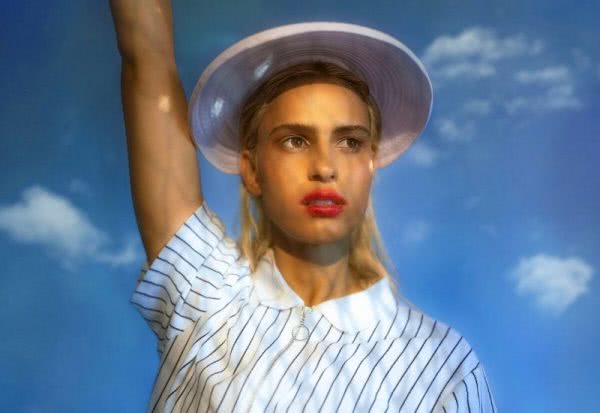
Throughout the project, there are many moments that explore the different ranges of pop, but the most interesting one you explore is the new futuristic kind of pop, especially on ‘Permission’, which heavily relies on autotune to convey emotion. What was behind that artistic choice?
I use autotune a bit in this record, I like this era that we’re going into where it feels like humans are coming into terms with the idea or morphing with technology and AI. I definitely want to be the first AI-human hybrid. It expresses a boundary, some of these songs have very vulnerable lyrics, like permission, and having that cloak on with the autotune is a way to feel safe for me and expresses the fact that sometimes things that are really hard to go through and make you really want to disassociate from the world.
With this new album, under the image of Banoffee, do you associate yourself with the persona of Banoffee or do you separate yourself from the image?
I used to separate them. I used to always say it was a costume that I could slip into but part of what happened to me when I moved overseas is I realised Banoffee was a lot of the things I wanted to be and I didn’t see the point of slipping in and out of that. No one in
America calls me Martha. Banoffee has become a first name for me over there and it’s definitely an identity for me which feels way more authentic. I’ve definitely morphed into Banoffee.
And what’s the image you want to create for banoffee in this new album space?
I wanted to show a different face. There are almost emo references, there’s emo guitar, I tried not to listen to too much music when I made it. When I did it was blink-182 and I was trying to move outside of electronic references that I’ve had in the past which were very smooth. There’s not much silkiness on this record, which I quite like. I wanted to portray a character that isn’t as damaged as some of the characters in the past. I wanted there to be some physical strength, a little bit of self-awareness. I feel like I really know who I am now, and I know what Banoffee is, there’s a lot of certainty there in that image. Everything aesthetically that is going to come out with
this album is completely considered and purposeful. That’s what I want for this record, I want it to stand tall on its own.
I feel like that self-love and confidence comes through. Do you find it difficult to carve a specific image in pop? Everyone expects pop from you, do you feel you have to stick to that?
I’m told I’m supposed to, but I don’t. A lot of people have this theory that consistency is what makes your audience feel comfortable and safe and you gain followers for life. But that’s not why I got into music. I have the most fun jumping around. My brain is manic, and I don’t want to stick on something for too long.
For me, if I stay too consistent in an image or style for too long, I see it as a mistake. I constantly want to be growing.
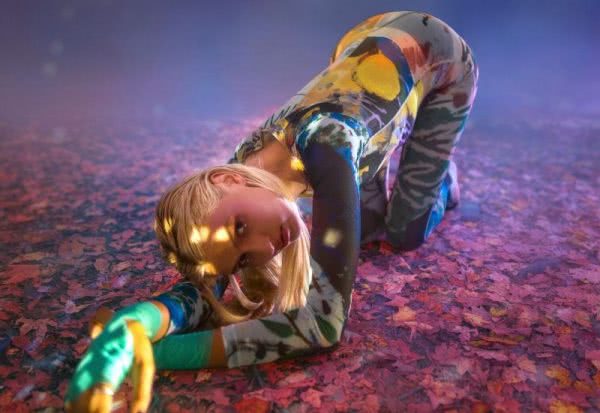
Who would you say are the musical influences in your life right now?
I’ve been listening to a lot of music that I first listened to which has been really interesting to me. I’ve been listening to the first two albums of Fiona Apple which I love in terms of her just being so brutally honest. And also, non-committal in her melodies which I really love. There are some artists back here that really inspire me like Stella Donnelley.
When she came out with ‘Boys will be Boys’, it was such a real moment for me in realising I was allowed to write songs like that. I wrote to her and was like ‘thank you so much for existing’. I would listen to her on repeat in LA. I would DM her in the canyon with all my lights off saying ‘just letting you know I’m still listening to this song in the pitch black, my car just broke down’ she’d just be like ‘Jesus’. She was a real inspiration for this.
Aldous Harding was as well. People who are just making music with no expectation. The other person weirdly who I got really into in 2019 was Alanis Morissette. She’s badass, does exactly what she wants, and she screams a lot. Which is why I scream a lot on this album.
On tracks like ‘This Is For Me’ there’s a real sense of self-love and overcoming obstacles of love. Is that something that felt urgent at the time of writing? Or just something you just wanted to write about?
It was pretty urgent. That song isn’t about another person, it’s really me singing to myself and about the way, especially in the arts, sometimes we romanticise darkness. We romanticise bad things that make good music or make people appear interesting but they’re really unhealthy – and having written two EPs that really delved into my depression at the time, I was just over it, I don’t want to write about that anymore and it felt really refreshing to write that song and put my foot down about it.
Even though I felt scared, are people going to be interested in an album that isn’t devo? They want weird sad musicians who die young because obviously those people make incredible music. Because sometimes having that intelligence and talent also comes with its taxes. It’s also really scary for people in music to be like ‘hey I want to be happy now, is that ok?’
I had to make the choice of whether I was ready to lose music in order to be happy. What if I just try and have a more regular life, and make more music? So, I made that decision and have been trying to stick to it. It’s always such a sweet surprise when you finally do that and everyone’s like ‘you’re fucking rad’.
Watch the video for ‘Count On You’ below.
Banoffee Album Launches
Tickets
Friday 6 March – Nocturnal x Fashion – Virgin Australia Melbourne Fashion Festival
Melbourne Museum, VIC
Tickets































